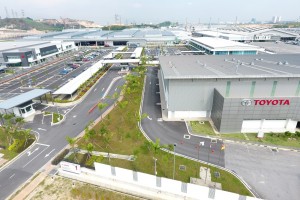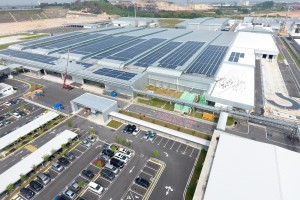UMW Toyota Motor To Invest In Production Of Hybrid Electric Vehicles
UMW Toyota Motor (UMWT) has announced that it is making additional investments to prepare its production facility for the mass production of Hybrid Electric Vehicles (HEV). It plans to spend another RM270 million into expanding its current manufacturing operations and facility. This will include the introduction of a new and technologically-advanced generation of Hybrid Electric Vehicles.
 UMWT has some 52 years of experience producing Toyota vehicles in Malaysia, and will be preparing itself to align with Toyota Motor Corporation’s (TMC) global commitment on carbon neutrality. “Toyota’s global direction is to achieve carbon neutrality by 2050. This is also in line with the Malaysian Government’s aspirations to position the country as a progressive nation that promotes more green technology and environmental sustainability,” said UMW Toyota Motor Deputy Chairman, Akio Takeyama.
UMWT has some 52 years of experience producing Toyota vehicles in Malaysia, and will be preparing itself to align with Toyota Motor Corporation’s (TMC) global commitment on carbon neutrality. “Toyota’s global direction is to achieve carbon neutrality by 2050. This is also in line with the Malaysian Government’s aspirations to position the country as a progressive nation that promotes more green technology and environmental sustainability,” said UMW Toyota Motor Deputy Chairman, Akio Takeyama.
“This is indeed an exciting time for the Malaysian automotive industry and UMW Toyota Motor is fully charged and ready to champion this Malaysian dream. In order to achieve this, the most realistic, practical and immediate solution is Toyota Hybrid Electric technology and vehicles,” he added.
 The initiative is driven by Toyota’s aim to deliver ‘mobility for all’ and produce ‘happiness for all’ through its commitment for a ‘Clean, Safe and Secure Society’. To realise this, TMC has committed to carbon neutrality by 2050, in a practical and sustainable manner. It is also part of the plan to produce a full line-up of Low-Emission Vehicles through its electrification plans. This will meet diversified mobility demands in different markets.
The initiative is driven by Toyota’s aim to deliver ‘mobility for all’ and produce ‘happiness for all’ through its commitment for a ‘Clean, Safe and Secure Society’. To realise this, TMC has committed to carbon neutrality by 2050, in a practical and sustainable manner. It is also part of the plan to produce a full line-up of Low-Emission Vehicles through its electrification plans. This will meet diversified mobility demands in different markets.
Apart from Electrified Vehicles, there are many initiatives in the pipeline to reduce carbon emissions and ‘offset’ the impact of carbon dioxide (CO2) emission in all its processes throughout the lifecycle of manufacturing, transporting, operating, fuel and/or charging, and recycling and disposal of vehicles.
“The mass production and growing acceptance of Hybrid Electric Vehicles (HEV) will lead to the entire automotive ecosystem evolving to embrace a more conscious and concerted effort in reducing Malaysia’s carbon footprint,” explained Takeyama. “Toyota’s direction is in line with the international lifecycle assessment approach for carbon neutrality which will entirely transform the industry, from the time a vehicle is manufactured and through the vehicle’s ownership, eventually even towards the end of the vehicle lifecycle,” he added.
Toyota is one of the pioneers of Hybrid Electric technology and has evolved and advanced the technology over the last 20-odd years. Its global sales of Hybrid Electric Vehicles (HEV), Plug-in Hybrid Electric Vehicles (PHEV), Battery-Electric Vehicles (BEV) and Hydrogen Fuel Cell Electric Vehicles (FCEV) totals over 17 million units thus far. Toyota’s cumulative contribution to CO2 reduction equates to 17 million cars that has resulted in removing 140 million tonnes of CO2 or approximately 1.5 million conventional passenger vehicles per year over the past 20 years.
 This push towards a cleaner, more efficient and sustainable alternative is expected to yield a sale of 8 million electrified vehicles per year by 2030 for Toyota. Earlier in April, Toyota announced its electric vehicle strategy that will see 15 new Battery-Electric Vehicles (BEV) released by 2025. In total, Toyota has committed to offering 70 electrified vehicle models by 2025. This will include vehicles powered by hydrogen fuel cells, battery-electric, and hybrid electric, in its bid to offer diversity for its customers.
This push towards a cleaner, more efficient and sustainable alternative is expected to yield a sale of 8 million electrified vehicles per year by 2030 for Toyota. Earlier in April, Toyota announced its electric vehicle strategy that will see 15 new Battery-Electric Vehicles (BEV) released by 2025. In total, Toyota has committed to offering 70 electrified vehicle models by 2025. This will include vehicles powered by hydrogen fuel cells, battery-electric, and hybrid electric, in its bid to offer diversity for its customers.
Further, Toyota’s ongoing investments on 4 fronts i.e. hybrid electric, plug-in hybrid electric, battery-electric and hydrogen fuel cell positions it as one of the most versatile auto manufacturers globally. It will have the agility to pivot its vehicle development towards practical and sustainable solutions, where the ecosystem, technology and infrastructure becomes viable, cost effective and widely accepted.
“We are ready with the introduction of Hybrid Electric Vehicles, and the technology; service support; current infrastructure; global and domestic policies; the level of affordability and cost effectiveness; and, consumer awareness and demand, particularly in Malaysia, are now at its most ideal conditions to pursue a new and exciting journey towards achieving carbon neutrality,” said Takeyama.
“Toyota Hybrid Electric Vehicles (HEV) are at their most advanced today, and presents itself as the most realistic, immediate, economical and practical solution for mass market production and sale in terms of reduced CO2 emission, convenient usage, and price acceptance by customers,” Takeyama said.
Moreover, research has shown that the reduction in CO2 emission levels between fully electric and Hybrid Electric Vehicles (HEV) are nearly similar when factoring in electricity source, from production and throughout ownership. For Malaysian car buyers, the local manufacturing of Toyota Hybrid Electric Vehicles would translate into advancing into a new era of motoring with the latest and most innovative technologies, at a price point that is practical and accessible.
“Hybrid Electric Vehicles (HEV) are a pivotal bridge to achieving full vehicle electrification. At present, the Battery Electric technology still requires time for full technology development making the Hybrid Electric technology most appropriate for immediate implementation. While time is still needed for full electrification, the HEV technology is ready today and the current infrastructure permits for it to be rolled out on a greater scale,” he said.
UMWT will make use of its new plant in Bukit Raja to champion carbon neutrality in Malaysia. The company had spent RM2 billion in the construction and commissioning of the plant which is regarded as one of the most modern, most advanced and most efficient Toyota plants in Asia. And as such, it is poised to strengthen Malaysia’s aspiration to become a regional automotive hub in Energy Efficient Vehicles (EEV).
The Bukit Raja plant’s sustainability effort includes a 2MW of solar panel system and 156 cubic metre rainwater collection system. It also holds the distinction of featuring the lowest Volatile Organic Compound emissions in Asia courtesy of a Regenerative Thermal Oxidiser.
 “As a manufacturer, the immediate steps we can take to prevent global warming are to address our vehicles and manufacturing processes. But, the initiatives do not and cannot stop here. It involves a conscientious change in mindset in society, educating the young of the importance of protecting the environment and requiring the active participation of all stakeholders,” said Ravindran K., President of UMW Toyota Motor, adding that both Toyota and UMW Toyota Motor’s interests have gone beyond the automotive realm to offset the effects the CO2 emissions.
“As a manufacturer, the immediate steps we can take to prevent global warming are to address our vehicles and manufacturing processes. But, the initiatives do not and cannot stop here. It involves a conscientious change in mindset in society, educating the young of the importance of protecting the environment and requiring the active participation of all stakeholders,” said Ravindran K., President of UMW Toyota Motor, adding that both Toyota and UMW Toyota Motor’s interests have gone beyond the automotive realm to offset the effects the CO2 emissions.
 UMW Toyota Motor also continues to be at the helm of numerous environmental action plans. In January, UMWT organised the 20th edition of its Toyota Eco Youth (TEY) programme. This initiative began 20 years ago and has become a leading program cultivating environment consciousness and innovation amongst the youth of the nation involving schools, secondary school students and teachers.
UMW Toyota Motor also continues to be at the helm of numerous environmental action plans. In January, UMWT organised the 20th edition of its Toyota Eco Youth (TEY) programme. This initiative began 20 years ago and has become a leading program cultivating environment consciousness and innovation amongst the youth of the nation involving schools, secondary school students and teachers.
“The ultimate goal will not rest solely on vehicle electrification, but to achieve carbon neutrality and zero emission on all fronts, from putting cleaner vehicles on the road and addressing manufacturing processes, to helping to create greater awareness for the protection of the environment,” he added.
UMWT also acknowledges, with appreciation, that the government plays a key role in supporting the development and advancement of the local automotive industry. Its policies will determine whether Malaysia will be a leader in automotive advancements and sustainable development.
 “We are in an ideal position to drive this ambition forward in making it a reality, and it is our hope that the Government will understand and support our endeavour for the local mass manufacturing of Hybrid Electric Vehicles (HEV) as an important cornerstone in the pursuit of wider electrification.” said Ravindran K.
“We are in an ideal position to drive this ambition forward in making it a reality, and it is our hope that the Government will understand and support our endeavour for the local mass manufacturing of Hybrid Electric Vehicles (HEV) as an important cornerstone in the pursuit of wider electrification.” said Ravindran K.
“The COVID-19 pandemic resulted in a challenging year for us. However, measures put in place by the Government had successfully restored and strengthened consumer confidence and purchasing power within the automotive industry. This illustrates the key role that the Government plays in the development of the automotive industry here in Malaysia.”
“The introduction of Hybrid Electric technology will quickly transform the automotive landscape in Malaysia for Malaysians. We hope that our endeavours to popularise tomorrow’s technology today through the mass inroduction of Hybrid Electric Vehicles (HEV) will receive due support from the Government in the pursuit of a full scale realisation of vehicle electrification. We hope that the Government will also consider UMW Toyota Motor’s efforts to be included in the National Low Carbon Mobility Blueprint alongside Battery Electric Vehicle which is in line with the Government’s plans,” he added.

























